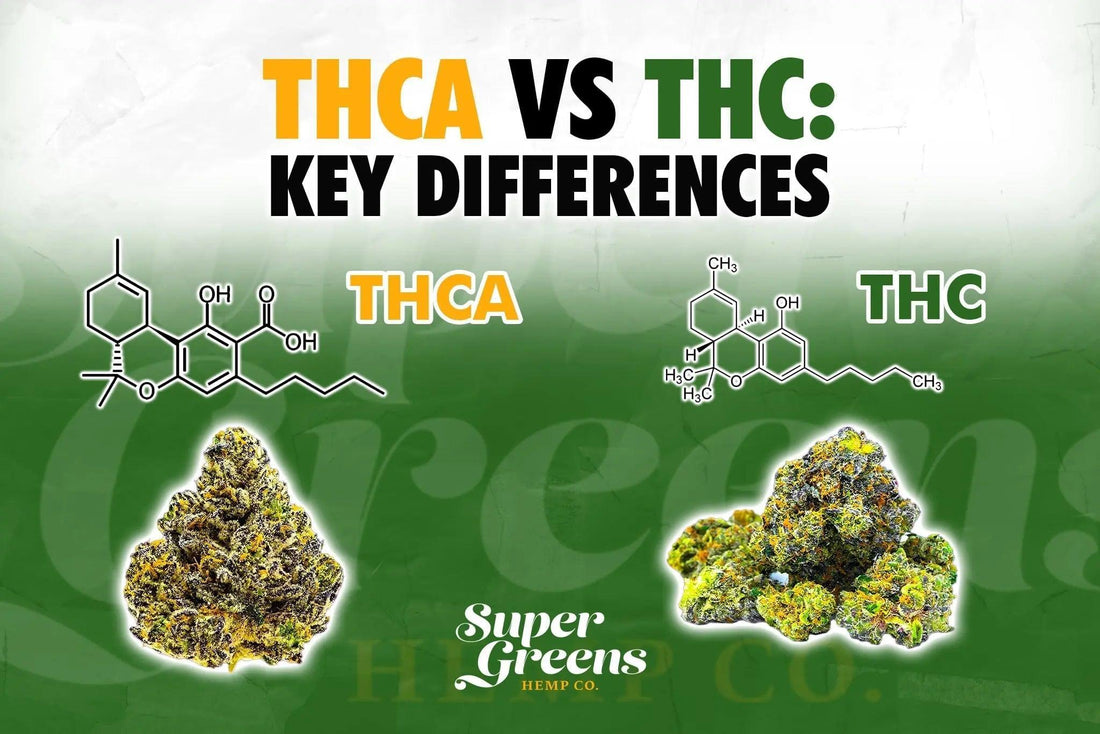
THCA vs THC: Key Differences
The cannabis plant contains over 100 different cannabinoids, but THCA and THC often top the list as the most talked about.
If you’ve tried cannabis before, you may already be familiar with THC, the compound that gets you that classic “high.” But on the other hand, THCA sounds somehow like THC and looks nearly identical at the molecular level. So what’s the difference between the two?
This guide will explain in detail how THCA and THC compare. You’ll learn about their chemical structure, effects, legality, etc. Keep reading to discover which one is right for you, especially if you plan to purchase soon.
What is THCA
THCA (or tetrahydrocannabinolic acid) is the raw, unheated form of THC found in living and freshly harvested cannabis plants.
If you’ve ever handled fresh cannabis flower, you’ve encountered THCA in its natural state. This compound is abundant in raw cannabis and is the precursor to the more famous THC.
Unlike THC, however, THCA is non-psychoactive when raw -meaning it won’t get you high no matter how much raw cannabis you consume.
It has a carboxylic acid group (COOH) that prevents it from binding to your brain’s cannabinoid receptors.
But once heated, THCA converts into THC; that’s where the psychoactive effects start to kick in. This process is known as decarboxylation, but stay tuned. We’ll get into that later in more detail.
What is Delta 9 THC
Delta-9 THC, or just THC, is the main psychoactive compound in cannabis, the one that causes the euphoric “high” people associate with cannabis use.
Unlike THCA, Delta-9 THC fits perfectly into the CB1 receptors in the endocannabinoid system in your brain.
This snug molecular fit is what causes the effects we call a cannabis high euphoria, altered perception, heightened senses, and sometimes increased appetite or relaxation.
Decarboxylation: The Science Behind THCA’s Transformation to THC

If you look up any weed-edible recipe, you will notice a common lingo, “First decarb your weed.” Or if you have made edibles, you know this is one of the most important parts—but why? Glad you asked.
As mentioned earlier, non-psychoactive THCA is what exists in raw cannabis buds. The magic happens when THCA is heated and turns into THC through a process called decarboxylation. This fancy word means removing the carboxyl group (COOH) from the THCA molecule and turning it into THC.
So, you can think of decarboxylation as simply activating the psychoactive effects of cannabis.
This can happen in several ways:
- Smoking: When you light up a joint, the high heat instantly decarboxylates THCA into THC.
- Vaping: The heat from the vape element converts THCA to psychoactive cannabinoid THC.
- Cooking: Making cannabis brownies? The baking process decarboxylates the cannabis. That’s why edibles can be so potent.
- Aging: Even at room temperature, THCA slowly converts to THC over time, but at a much slower rate.
The efficiency of decarboxylation depends on temperature and time. At around 220°F (104°C), decarboxylation takes about 30-45 minutes. Higher temperatures speed up the process but risk destroying other beneficial compounds like terpenes that contribute to cannabis’s effects and flavor profile.
Most dried and cured cannabis still contains a mix of THCA and THC. That’s why if you have purchased legal cannabis products, you will notice the labeling often shows percentages of both compounds.
THCA vs THC: Key Differences Compared

Now that we understand both compounds individually, let’s directly compare them across several important dimensions to clarify their distinctions.
State in the Cannabis Plant
THCA is found naturally in growing and freshly harvested cannabis plants. When you look at those sparkly trichomes on a fresh bud, you mostly see THCA crystals, not THC.
THC is barely present in living cannabis plants. It forms primarily after harvest through decarboxylation as the plant dries, cures, or is heated. That’s why raw cannabis won’t get you high if eaten without heating.
Chemical structure
At first glance, the difference in their molecular structure might seem small on paper, but it’s profound in effect. THCA contains that extra carboxylic acid group (COOH), making the molecule too large to fit properly into the brain’s cannabinoid receptors.
Meanwhile, THC lacks this acid group, giving it the perfect shape to bind with the body’s endocannabinoid system, particularly CB1 receptors in the brain, triggering the psychoactive effects cannabis is known for.
Psychoactive Effects
This is the most apparent difference between these two cannabinoids. THCA is non-psychoactive, meaning it doesn’t get you high or impair your cognitive function when consumed in its raw form.
THC is definitely psychoactive. It gets you high with effects that may include euphoria, altered perception, relaxation, appetite stimulation (munchies), and, in some cases, anxiety or paranoia, depending on the individual and dosage.
Legality
The legal status of THCA and THC can be quite complicated in the United States. At the federal level, THC remains a controlled substance. However, many states have legalized it for medical use or recreational purposes.
THCA, on the other hand, exists in a grey area. Under federal guidelines, THCA is legal if it’s from hemp-derived sources with less than 0.3% THC on a dry weight basis, as stated in the 2018 farm bill. Because of this loophole, you can buy THCA products online from brands like Super Greens and have them shipped to your door.
However, local legality can vary greatly, so always check your state laws before you buy.
Drug tests
Will THCA or THC make you fail a drug test? Unfortunately yes. Most tests look for THC metabolites - compounds your body produces after you ingest or decarb THC. Since both consumed THC and activated THCA break down into the same metabolites, either compound will trigger a positive result.
If you regularly undergo testing for your job or athletic requirements, it is wise to proceed with caution regarding cannabis use. Even raw cannabis forms (unheated cannabis) can partially decarb due to the heat produced by the internal process in your body.
Side Effects and Risks
THC has many potential side effects when taken in large amounts. These can include dry mouth, red eyes, impaired motor skills, anxiety, paranoia, and increased heart rate. Overuse can also cause short-term impairment that interferes with daily tasks.
Once THCA is fully decarbed to THC, it can have similar effects to THC. So, is THCA safe? Generally yes. THCA is well tolerated by most people if they consume it in moderation and buy it from a reputable dispensary.
Consumption Methods: How to Use THCA and THC
The industry has taken full advantage of THCA’s lenient legal position—it’s essentially sleeping THC in a federally-compliant form. Most consumers seek these products primarily for recreational purposes, and consumption couldn’t be simpler.
You can experience THCA-turned-THC effects through all the usual methods:
- Smoking: The classic way – THCA flower in a pipe, bong, or joint, and you’ll instantly decarb and get THC effects.
- Vaporizing: A gentler way of smoking that still converts THCA to THC with fewer respiratory irritants.
- Dabbing: For experienced users, high-THCA concentrates and diamonds will get intense effects when dabbed.
- Gummies and edibles: Pre-decarboxylated THCA edibles give you longer-lasting effects as the THC gets processed through your liver.
- Pre-rolls: Pre-rolled joints filled with high-THCA hemp flower for easy use.
The effects will vary depending on the strain and your tolerance. If you’re using a Sativa-dominant strain, you’ll get more energizing cerebral effects, perfect for daytime or social situations. Indica-dominant strains will give you more relaxing, body-focused effects—perfect for evening or sleep support.
Some people do use THCA in its raw form through tinctures, juicing, or raw cannabis smoothies to experience the therapeutic benefits without the high. But we recommend talking to a doctor first if you plan to use any of these products for medical use or potential health benefits.
Where to Buy The Best THCA Products Online

THCA and THC have their share of differences and similarities. But, what makes THCA attractive to many consumers is its more favorable legal status compared to Delta-9 THC, which means wider availability across the country.
Looking to try the best THCA products? Then Super Greens should be your go-to for high-potency THCA flowers and other products like gummies, concentrates, and vapes.
Super Greens THCA products are third-party lab-tested, so you can always trust our quality and exceptional customer service. We will have you coming back for more. Browse our collections today and discover the difference premium hemp products can make for your lifestyle and enjoyment.
FAQs
What is the main difference between THCA and THC?
The main difference between THCA and THC is their psychoactive properties. THCA is non-intoxicating in its raw form, while THC is known to produce psychoactive effects.
When heated, THCA converts to THC, and it’s, therefore, the form that THC takes in raw, unheated cannabis plants.
Does THCA turn into Delta 9 THC in your body?
THCA can partially convert to Delta-9 THC in your body, but the conversion is minimal without heat. The human body temperature (98.6°F/37°C) is generally too low to efficiently drive the decarboxylation process that converts THCA to THC.
However, small amounts may convert during digestion, which is why consuming large quantities of raw cannabis could potentially produce mild effects.
Does THCA have psychoactive effects?
No. In its raw form, THCA does not cause the classic cannabis high. Once heated, though, it becomes THC, which can deliver psychoactive effects.
Is THCA the same high as THC?
Yes. When THCA is smoked, vaped, or heated, it converts to THC, which then produces the same high as consuming THC directly.
Can THCA make you fail a drug test?
Yes, THCA can make you fail a drug test. Standard tests look for THC metabolites, which can result from consuming either THCA in your body.
What is the legal status of THCA compared to THC?
THCA is legal federally under the 2018 Farm Bill as long as it’s derived from hemp plants with less than 0.3% Delta-9 THC. THC remains a controlled substance at the federal level, though many states have their own laws, with some allowing its use.
Is buying THCA online legal?
Yes, you can buy THCA online from reputable brands like Super Greens. Hemp-derived THCA products are federally legal, but always check your state laws, as they vary by location.
Does Super Greens THCA Flower get you high?
Yes, Super Greens carries high THCA flower that will get you high when you smoke, vape or heat them. The THCA converts to THC through decarboxylation and gets you the classic cannabis experience.




